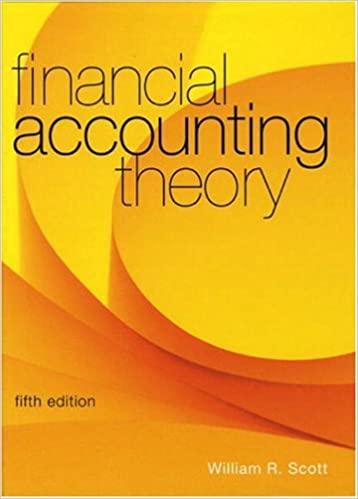The following article by John Partridge appeared in The Globe and Mail, August 23, 2001. It discusses
Question:
The following article by John Partridge appeared in The Globe and Mail, August 23, 2001.
It discusses the decision by Canadian Imperial Bank of Commerce (CIBC) to discontinue separate disclosure of gains on sales of portions of its “bonanza” investment in Global Crossing Ltd.
Silence on Global Gains Seen Helping CIBC When Canadian Imperial Bank of Commerce reported its third-quarter results on Monday, it kept its mouth firmly shut about its bonanza investment in Global Crossing Ltd. for the first time since 1999.
Analysts say that CIBC’s sudden reticence about the rich gains it has been making on its original $30-million (U.S.) stake in the Bermuda-based telecommunications company could help start a recovery in the bank's lagging stock market valuation—although some of them contend that the change in disclosure is a step backwards.
“We debated whether we should continue to disclose the [gains on] Global Crossing and other large merchant banking investment, and we concluded that we wouldn't be going forward,” Tom Woods, CIBC's chief financial officer, told analysts during the quarterly conference call.
Despite the new vow of silence, Global Crossing has given CIBC a lot to crow about.
Back in 1999, the value of the bank's initial investment in Global Crossing soared to more than $4.3-billion as the Bermuda company caught the updraft of the telecom and high-tech boom. Its shares skyrocketed to a high of $54.
CIBC made a pretax gain of $583-million (Canadian) by selling some of its Global Crossing stock that year, and another $697-million in 2000. This second sale translated to $397-million after tax, equal to nearly 20 percent of the bank's $2.06-billion profit last year.
And in this year’s second quarter, when CIBC put a total of $426-million on the bottom line, Global Crossing gains brought it another tidy $314-million before taxes.
The Bermuda company’s shares have plummeted to less than $5 (U.S.) apiece in the telecom and tech meltdown, but CIBC had already hedged much of its remaining stake in the company through forward sales contracts. According to its annual report for 2000, the hedges mature between this year and 2003, and are at prices ranging from a “floor”
or low of $20 to $28 a share to a “ceiling” of $46 to $64.
Analysts figure CIBC still has about $1.5-billion (Canadian) in unrealized but locked in gains on its big score. “It's a huge number,” one said.
During Monday's conference call, Mr. Woods didn’t explain why the bank has decided to stop breaking out these gains.
But analysts are pretty sure they know the reason. CIBC, they say, figures it has been penalized for disclosing them, and is betting that silence on the topic may be golden for its share price.
That price could unquestionably do with a bit of help. Despite rallying this week, CIBC’s stock currently carries the worst “beta” or volatility rating among the five biggest domestic banks, and the lowest price-earnings multiple.
“Everybody would strip out the Global Crossing gains from the numbers,” one analyst said, explaining how he and his colleagues have used the information until now.
“They're saying ‘Well, how is it that when we do well you take it out, but when we do badly you analysts leave it in? We're not getting any credit for it, so we're going to bury it in our earnings, and you guys can do whatever you want to do.'”
CIBC's new approach will instead allow it to use the Global Crossing gains to discreetly smooth and manage—and make more predictable—its overall financial results, without observers being able to divine precisely how this was done. This is a practice already widely followed by other banks in similar situations, and as another analyst put it, CIBC was simply “trying to be too honorable.”
Some observers are unhappy that the bank has decided to go quiet on Global Crossing. For instance, in a report issued Tuesday, analyst James Bantis of Credit Suisse First Boston called the move “a step back” after two years in which the bank has “made great strides towards improving the level of financial disclosure and source of earnings.”
Mr. Bantis complained that no longer disclosing the Global Crossing gains—which he considers non-recurring—"reduces the quality and transparency of CIBC’s earnings over the medium term.”
Still, the view is that over time, CIBC’s market valuation will benefit because there are few things investors like banks to have more than “earnings visibility,” that is, predictable results.
“Historically, CIBC has not been prepared to smooth their earnings, but that changed in this quarter,” one of the analysts said. “What it means is that there’s going to be much better earnings visibility out of the Commerce, because they've got $1.5-billion in gains left and total flexibility about bringing it in whenever they want... Intuitively, they're going to book them when they most need them.”
Another analyst concurred, saying that the new approach will likely be a positive influence on Bay Street's profit forecasts for the bank, and that this, in turn, “will be positive for their valuation.”
Required
a. Will this reduction of disclosure affect the market's ability to evaluate the persistence of CIBC's earnings? Explain.
b. Accounting standards in Canada require separate income statement disclosure of gains and losses that do not have all of the characteristics of extraordinary items but which are not expected to occur frequently over several years or do not typify normal business activities (see Section5.
5). Do you feel that CIBC's reduction of disclosure violates this requirement? Explain why or why not.
c. How do you think the securities market will react to this reduction of disclosure?
Explain.
d. In this case, it seems that private market forces to motivate information production have failed. Should new regulations be put into place to strengthen requirements for separate disclosure of gains and losses on sales of this nature? Explain why or why not.
Step by Step Answer:






